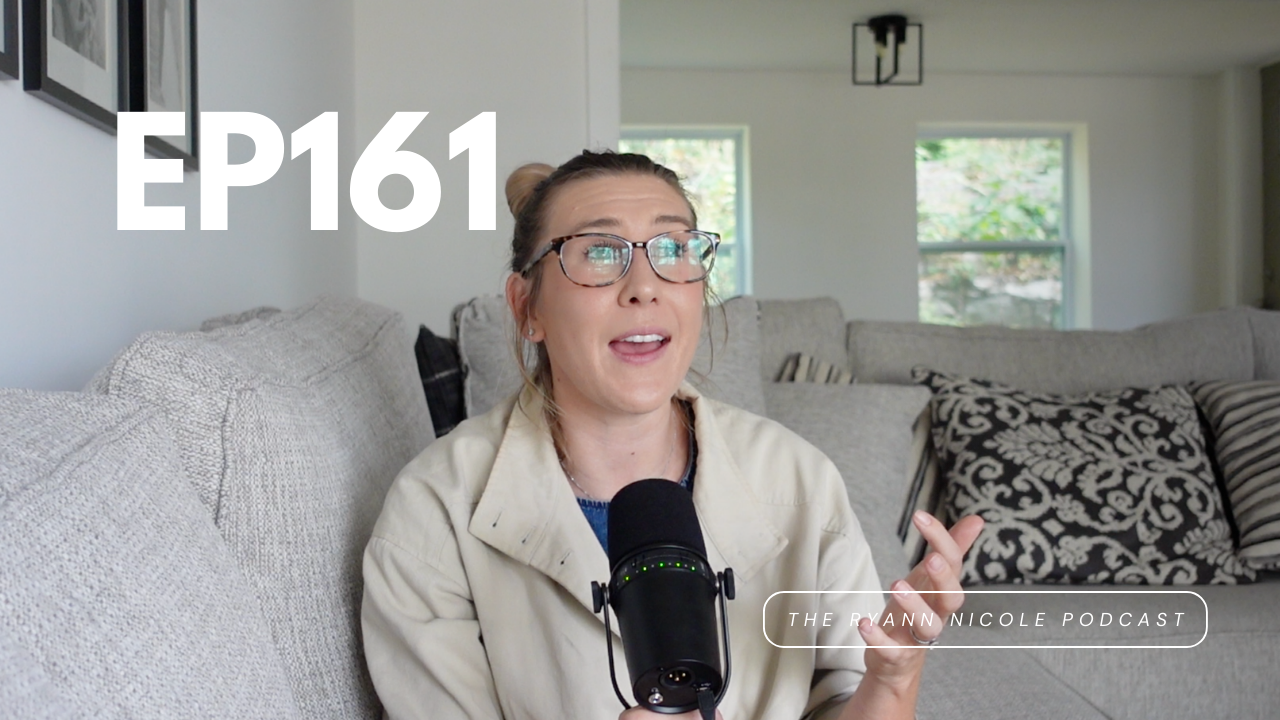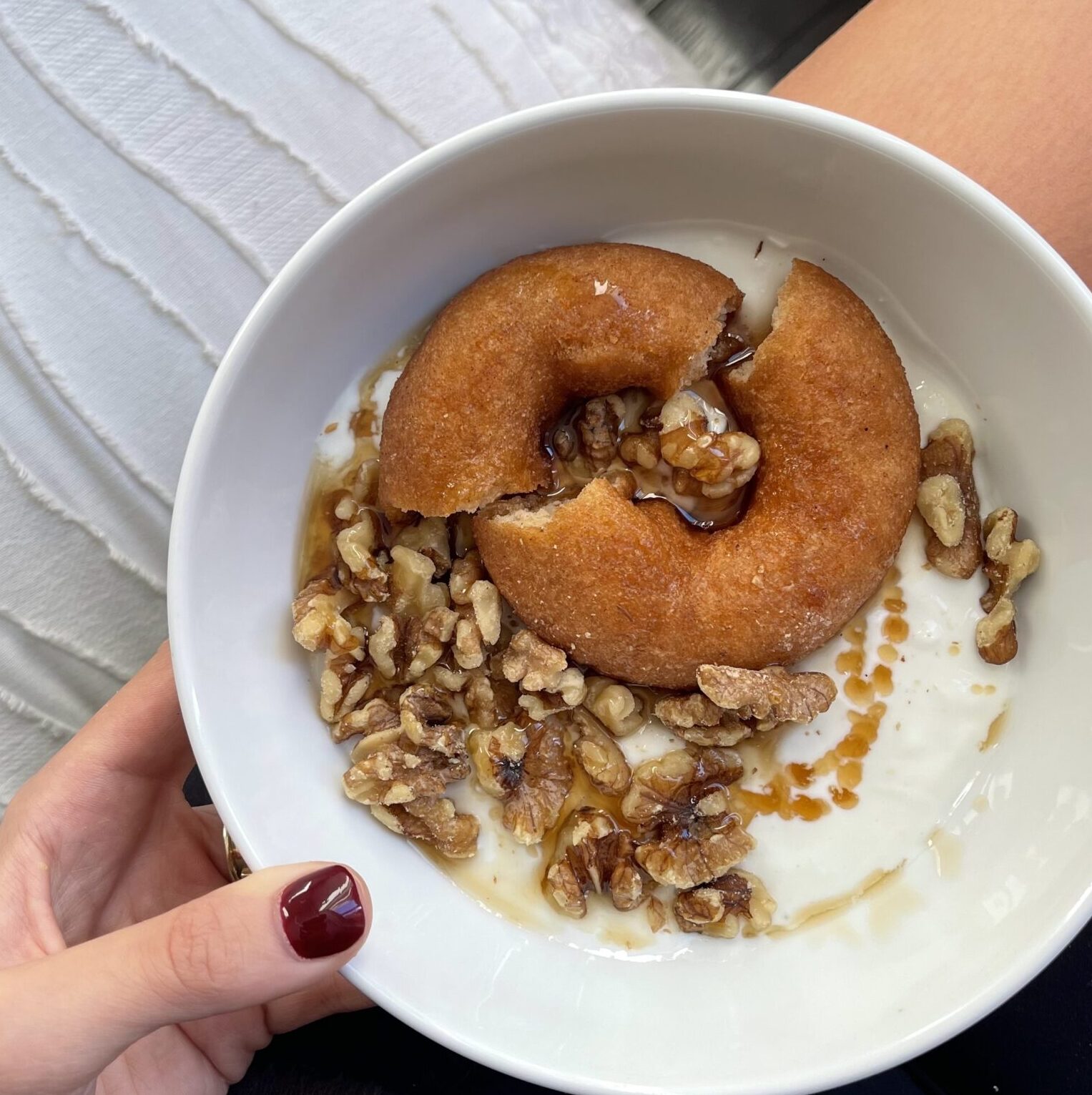Are You Binge Eating, or Just Eating a Lot? Here’s How to Tell (and Why It Matters)
February 5, 2024

Hey There, I'm Ryann Nicole.
I’m a recovered binge eater who changed the story from something that happened to me to something that happened for me. Now, I’m a licensed therapist teaching you to do the same.
My mission? To help you ditch food stress and live your life with mental peace and freedom every single day!
What is the difference between eating a lot and binge eating? I mean, the word “binge” gets thrown around so often that it feels like it’s lost its meaning. You hear people say they “binged” a show, “binged” a podcast, or “binged” on pizza last night with friends. I remember when I was trying to make sense of my own relationship with food, a friend mentioned she “binged” too. But when she described it, it was just a night of eating a bunch of pizza with friends—she’d stopped when she was full and didn’t feel all that bad after. Meanwhile, what I was doing with food felt completely different, like I couldn’t stop, like I’d lost control.
So if “binge” can mean so many things, then how do we know what’s really going on when we find ourselves eating more than usual? Are we just having a big meal? Or is it something deeper? Let’s get into the heart of what binge eating actually is and how it differs from just enjoying a bit (or a lot) more food than usual. And if you’re feeling stuck or not sure what’s “normal” with food, don’t worry—you’re not alone, and we’ll break down some of those signs to help.
Binge Eating: It’s Not Just Eating a Lot
Binge eating is more than just that “Oh wow, I ate way too much at dinner” feeling. Binge eating has this loss of control that can feel overwhelming, like food has taken over and you’re along for the ride. People often describe it as being in a fog or in autopilot mode, just going through the motions of eating even though they’re already full. And it’s fast, usually way faster than how you’d eat normally. You might know you’re full but just keep going because stopping doesn’t feel like an option at that moment.
And then comes the aftermath. For a lot of people, after the binge, there’s this wave of shame, guilt, and frustration—like, “Why did I do that?” or “What’s wrong with me?” It’s not just physical fullness; it’s an emotional weight, too, and that’s what can make binge eating feel so different. It’s not about enjoying food; it’s more about numbing out or trying to cope with emotions that feel too much to handle.
Key Signs of Binge Eating:
Loss of Control: You’re eating, but it feels like you can’t stop even if you want to. It’s like food is running the show.
Eating Quickly: Most binge episodes happen fast, almost like your mind can’t keep up with what’s happening.
Emotional Triggers: A lot of binge episodes are tied to emotions—stress, sadness, boredom. Food becomes a way to deal with something deeper.
Frequency and Patterns: Binge eating isn’t just a one-time thing; it happens regularly, often at least once a week for months.
Psychological Toll: After a binge, the emotional fallout can feel intense—guilt, shame, and feeling bad about yourself, like you let yourself down.
Recognizing these signs can be a bit overwhelming, especially when binge eating has become a regular part of life. It’s more than just food at this point—there’s an emotional weight that makes the experience feel so much heavier.
Just Eating a Lot: When It’s Normal (and Actually Enjoyable)
Now, let’s talk about just eating a lot, which is way different. Think about times you’ve been out with friends, and the food was so good that you went back for seconds or thirds. Or maybe it’s a holiday, and you’re enjoying all the amazing food without even thinking twice. That’s what “just eating a lot” looks like—there’s enjoyment, choice, and control. You know what you’re doing, and you’re not beating yourself up for it later.
It’s something we all do from time to time, and it doesn’t make you feel terrible after. You’re not using food to numb or escape emotions; you’re just, well, eating a bit more than usual because you want to. And after, you’re probably a little full, maybe even uncomfortable, but you move on. It doesn’t hang over you the next day.
Key Signs of Just Eating a Lot:
Occasional Indulgence: It’s not a regular thing, more of a “sometimes” kind of thing.
Social and Cultural Influence: You’re likely eating a lot because of the setting—a celebration, a dinner party, or just because the food is too good to pass up.
You’re in Control: You know you could stop, but you’re choosing to have a bit more. There’s no fog or feeling like you’re powerless to stop.
No Emotional Hangover: Sure, you might feel full, but you’re not hit with a wave of shame or guilt afterward.
So, How Do You Know If It’s Time to Seek Help?
If you’re feeling stuck in a cycle with binge eating—if it’s happening regularly, and you’re left with those feelings of shame and guilt afterward—it might be time to reach out. Binge eating can be really isolating, and the toll it takes on your mental health can be huge. It’s not just about food; it’s about finding a way to cope with emotions and stress that isn’t leaving you feeling worse in the end.
When You’re Ready: Support for binge eating can look a lot of different ways, from talking with a therapist or dietitian who understands eating disorders to finding a support group or coach. It’s all about finding what works for you. The idea isn’t to “fix” you; it’s to help you find a new way to cope with emotions that doesn’t involve food running the show.
At the end of the day, food should be something you can enjoy without feeling trapped by it, and if that’s not where you’re at, it’s okay to get help. Because life’s way too short to spend every day feeling like you’re fighting food battles in your head.
check out the pod
Ways I Can Support You
01 Coaching
Intimate group coaching to break free from binge eating
02 podcast
Real talk on food, mindset shifts, motherhood, and finding peace.
03 support group
A safe space to connect with others on the same journey.
04 free coaching
Have real conversations and hear others share their struggles.
Ryann Nicole
Licensed Therapist, Certified Nutritionist, and Virtual Wellness Coach
Ryann is a licensed therapist and virtual wellness coach who has assisted individuals worldwide in establishing a healthier relationship with food and their bodies.
Are You Ready to Heal Your Relationship With Food?
I understand—it can be overwhelming to figure out where to begin. Let's simplify things and have you start right here:
Why Am I Overeating?
First Steps To Stop Binge Eating
The Ryann Nicole
Podcast
FREE QUIZ
FREE GUIDE
Podcast
the food freedom lab podcast



